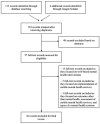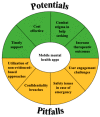Potential and Pitfalls of Mobile Mental Health Apps in Traditional Treatment: An Umbrella Review
- PMID: 36143161
- PMCID: PMC9505389
- DOI: 10.3390/jpm12091376
Potential and Pitfalls of Mobile Mental Health Apps in Traditional Treatment: An Umbrella Review
Abstract
While the rapid growth of mobile mental health applications has offered an avenue of support unbridled by physical distance, time, and cost, the digitalization of traditional interventions has also triggered doubts surrounding their effectiveness and safety. Given the need for a more comprehensive and up-to-date understanding of mobile mental health apps in traditional treatment, this umbrella review provides a holistic summary of their key potential and pitfalls. A total of 36 reviews published between 2014 and 2022-including systematic reviews, meta-analyses, scoping reviews, and literature reviews-were identified from the Cochrane library, Medline (via PubMed Central), and Scopus databases. The majority of results supported the key potential of apps in helping to (1) provide timely support, (2) ease the costs of mental healthcare, (3) combat stigma in help-seeking, and (4) enhance therapeutic outcomes. Our results also identified common themes of apps' pitfalls (i.e., challenges faced by app users), including (1) user engagement issues, (2) safety issues in emergencies, (3) privacy and confidentiality breaches, and (4) the utilization of non-evidence-based approaches. We synthesize the potential and pitfalls of mental health apps provided by the reviews and outline critical avenues for future research.
Keywords: mental health; mobile applications; technology-based care.
Conflict of interest statement
The authors declare no conflict of interest.
Figures
References
-
- Clough B.A., Casey L.M. The Smart Therapist: A Look to the Future of Smartphones and MHealth Technologies in Psychotherapy. Prof. Psychol. Res. Pract. 2015;46:147–153. doi: 10.1037/pro0000011. - DOI
-
- Kretzschmar K., Tyroll H., Pavarini G., Manzini A., Singh I., NeurOx Young People’s Advisory Group Can Your Phone Be Your Therapist? Young People’s Ethical Perspectives on the Use of Fully Automated Conversational Agents (Chatbots) in Mental Health Support. Biomed. Inform. Insights. 2019;11:1178222619829083. doi: 10.1177/1178222619829083. - DOI - PMC - PubMed
-
- Ha S.W., Kim J. Designing a Scalable, Accessible, and Effective Mobile App Based Solution for Common Mental Health Problems. Int. J. Hum. Comput. Interact. 2020;36:1354–1367. doi: 10.1080/10447318.2020.1750792. - DOI
Publication types
Grants and funding
LinkOut - more resources
Full Text Sources



